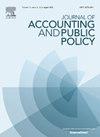Expected loss recognition and banks’ management forecasts
IF 2.2
3区 管理学
Q1 BUSINESS, FINANCE
引用次数: 0
Abstract
Accounting rules for credit impairment recognition have been shifting to a more forward-looking approach based on expected losses. We examine how the adoption of an expected loss model (ELM) influences banks’ management forecasts, which also are forward-looking. In a difference-in-differences setting of gradual implementations of the ELM worldwide, we find that banks enhance management forecasts after adopting the future-oriented provisioning model, as manifested in higher likelihood of forecast issuance, higher frequency of forecasts, more precise forecasts, and higher overall forecast quality. This forecast-enhancing effect is more prominent when accounting standards are more strictly enforced, when banks experience larger changes in loss allowance after ELM implementation, and when forecasting is more challenging such as during the onset of the COVID-19 pandemic. Moreover, banks’ post-ELM forecasting performance also improves in terms of greater forecast accuracy and persistency. Overall, our results suggest a complementary relation between expected loss recognition and banks’ management forecasts.
预期损失确认和银行管理层预测
有关信用减值确认的会计准则一直在转向基于预期损失的更具前瞻性的方法。我们研究了预期损失模型(ELM)的采用如何影响银行的管理层预测,这也是前瞻性的。在全球范围内逐步实施ELM的差异中,我们发现银行在采用面向未来的准备金模型后,管理预测得到了提升,表现为预测发布的可能性更高、预测频率更高、预测精度更高、整体预测质量更高。当会计准则得到更严格的执行时,当银行在实施ELM后损失准备发生较大变化时,以及当预测更具挑战性时(例如在COVID-19大流行爆发期间),这种增强预测的效果更为突出。此外,银行的后elm预测性能在预测准确性和持续性方面也有所提高。总体而言,我们的研究结果表明预期损失确认与银行管理层预测之间存在互补关系。
本文章由计算机程序翻译,如有差异,请以英文原文为准。
求助全文
约1分钟内获得全文
求助全文
来源期刊

Journal of Accounting and Public Policy
Multiple-
CiteScore
4.80
自引率
2.80%
发文量
75
期刊介绍:
The Journal of Accounting and Public Policy publishes research papers focusing on the intersection between accounting and public policy. Preference is given to papers illuminating through theoretical or empirical analysis, the effects of accounting on public policy and vice-versa. Subjects treated in this journal include the interface of accounting with economics, political science, sociology, or law. The Journal includes a section entitled Accounting Letters. This section publishes short research articles that should not exceed approximately 3,000 words. The objective of this section is to facilitate the rapid dissemination of important accounting research. Accordingly, articles submitted to this section will be reviewed within fours weeks of receipt, revisions will be limited to one, and publication will occur within four months of acceptance.
 求助内容:
求助内容: 应助结果提醒方式:
应助结果提醒方式:


